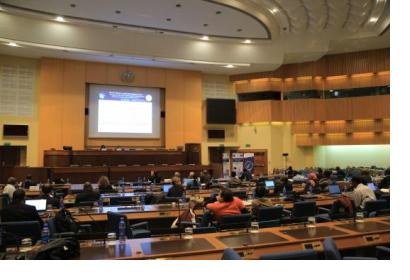As the African space sector is growing rapidly, with Ethiopia being the latest country from the region to [launch its first satellite](https://www.africanews.com/2019/12/19/ethiopia-s-historic-space-satellite-et-rss1-all-you-need-to-know/), the number of initiatives to make use of space technologies in sustainable development is increasing. In November 2019, for instance, Egypt launched the [African Development Satellite Project](https://africanews.space/egypt-to-launch-a-pan-african-satellite-development-initiative-on-wednesday/) at a meeting with heads of space agencies from Nigeria, Ghana, Kenya, Uganda, Sudan, Morocco and Botswana. Among others, the project aims to develop a space system able to monitor the greenhouse gas emissions that cause global warming and their impact on the African continent. The [African Resource Management Constellation (ARMC)](https://www.sansa.org.za/2019/08/13/pan-african-satellite-constellation-in-the-works/), which was revitalized in 2018 and is operated by Algeria, Kenya, Nigeria and South Africa, aims to create shared and affordable Earth observations satellite data to support environmental and resource management in Africa. At the 8th African Space Leadership Conference (ASLC), which took place in Addis Ababa, Ethiopia, from 2 to 4 December 2019 on the topic of “Space Science and Technology for Sustainable Development: Prospects and Challenges of African Space Development”, UN-SPIDER was given the opportunity to discuss with space agencies from across Africa how Earth observation, telecommunications and global navigation satellite systems can support disaster management efforts, and to present on its work with civil protection agencies in the region to support the institutionalization of the use of space data in disaster risk management and emergency response operations. ASLC is a biennial gathering of space agencies, research institutes and companies from across the continent. The objectives of the event were to promote the benefits of space;identify major challenges in implementing space programs in Africa; encourage intra-African cooperation; and strengthen the ASLC through the adoption of a constitution and other regulations. A Youth Forum and Women in Aerospace – Africa (WI-A) business meeting were held on the sidelines of the conference. During its presentation, which focused on its work in Africa, UN-SPIDER highlighted the programme's activities in the areas of knowledge mangement, capacity-building, and bringing together of the space and disaster management communities in conferences and expert meetings. To strengthen national capacities in using space-based data, for instance from the European Sentinel satellite fleet, UN-SPIDER also runs training courses that are based on step-by-step procedures it develops together with its partners for downloading, processing and mapping Earth observation data. These so-called [Recommended Practices](/advisory-support/recommended-practices) are available on the Knowledge Portal. When it comes to data for emergency response operations, the programme promotes mechanisms such as the International Charter "Space and Major Disasters" and the Copernicus Emergency Mapping Service (EMS) among disaster management agencies in Africa and elsewhere. In the recent past, UN-SPIDER organized two events focussing on the role of space technologies for managing risks and responding to disasters in Africa - the [UN-SPIDER International Expert Meeting "Towards Big (Space) Data in Support of Disaster Risk Reduction and Emergency Response in Africa"](/news-and-events/events/un-spider-expert-meeting-big-space-data-africa) and the [UN-SPIDER Bonn International Conference "Space-based Solutions for Disaster Management in Africa: Challenges, Applications, Partnerships"](/news-and-events/events/bonn-conference-2019). In addition, it carried out several technical advisory support activities in the region, for instance in August 2019 in [Ethiopia](/news-and-events/news/un-spider-strengthens-use-space-data-drought-early-warning-ethiopia) and July 2019 in [Cameroon](/advisory-support/advisory-missions/institutional-strengthening-missions/cameroon-ism-2019). To support stakeholders in these countries in accessing and using geospatial information, the programme created booklets with sources of space-based information that would support monitoring and responding to the most common hazards in those countries such as floods and drought. The booklets can be downloaded [here](/sites/default/files/Data_sources_UN-SPIDER_Ethiopia_August_2019%29_small.pdf) for Ethiopia and [here](/sites/default/files/Data-sources-UN-SPIDER_Cameroon_ISM_July_2019.pdf) for Cameroon. Besides attending ASLC, UN-SPIDER also conducted meetings with the Ethiopian Space Science and Technology Institute (ESSTI) and the National Disaster Risk Management Centre (NDRMC) as a follow up to its August 2019 mission to the country.

